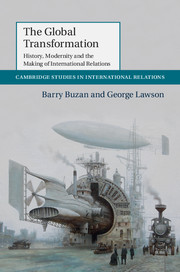Book contents
- Frontmatter
- Dedication
- Contents
- List of Figures
- List of Tables
- Preface
- List of Abbreviations
- Introduction
- Part I The Global Transformation and IR
- Part II The Making of Modern International Relations
- 3 Shrinking the Planet
- 4 Ideologies of Progress
- 5 The Transformation of Political Units
- 6 Establishing a Core–Periphery International Order
- 7 Eroding the Core–Periphery International Order
- 8 The Transformation of Great Powers, Great Power Relations and War
- Part III Implications
- Bibliography
- Index
8 - The Transformation of Great Powers, Great Power Relations and War
Published online by Cambridge University Press: 05 February 2015
- Frontmatter
- Dedication
- Contents
- List of Figures
- List of Tables
- Preface
- List of Abbreviations
- Introduction
- Part I The Global Transformation and IR
- Part II The Making of Modern International Relations
- 3 Shrinking the Planet
- 4 Ideologies of Progress
- 5 The Transformation of Political Units
- 6 Establishing a Core–Periphery International Order
- 7 Eroding the Core–Periphery International Order
- 8 The Transformation of Great Powers, Great Power Relations and War
- Part III Implications
- Bibliography
- Index
Summary
The Impact of the Global Transformation
During the nineteenth century, the character of military relations amongst the great powers changed markedly (Pearton, 1982; Giddens, 1985: 223–6; Gray, 2012: chs. 3–5), so much so as to change the qualifications for having status as a great power. Key to this was that from the 1830s and 1840s onwards, continuous and rapid technological innovation underpinned what has become a permanent ‘revolution in military affairs’ (RMA). We have already argued in Chapter 6 that new weapons, new logistics and new modes of military organization and training gave the West a decisive power advantage over other peoples during the first stages of the global transformation. This advantage was one of the main factors enabling the extension of Western control over large territories and populations in Africa and Asia. It also featured in the eastward and southward expansion of Russia, as well as the westward expansion of the US after independence.
In this chapter, we focus on the core, where the other major consequence of this new mode of military power unfolded: the transformation of great power war and the criteria by which states could establish themselves as, and be accepted as, great powers. Changes in military organization and technology underlie both core and core–periphery dynamics. Another link between them is that, up until the Second World War, the acquisition (or loss) of colonies was an important marker of great power standing: Britain and France had their ‘place in the sun’ and the second round of industrializing powers, Germany, Japan and the US, wanted theirs. The new technologies of the nineteenth century made empires quite easy to acquire. As Brodie (1941: 106–7) argues: ‘It is not an historical accident that the powerful resurgence of imperialism in the latter part of the nineteenth century coincided with the great development of the steamship.’ But colonial rivalry also destabilized great power relations. The ‘Scramble for Africa’, the rivalry between Russia and Japan to control Korea and Manchuria, Spain’s cession of Cuba and the Philippines to the US, Anglo-French rivalries in the Middle East, and Anglo-Russian hostilities in Iran and Afghanistan all played into both core–periphery and great power relations.
- Type
- Chapter
- Information
- The Global TransformationHistory, Modernity and the Making of International Relations, pp. 240 - 270Publisher: Cambridge University PressPrint publication year: 2015

